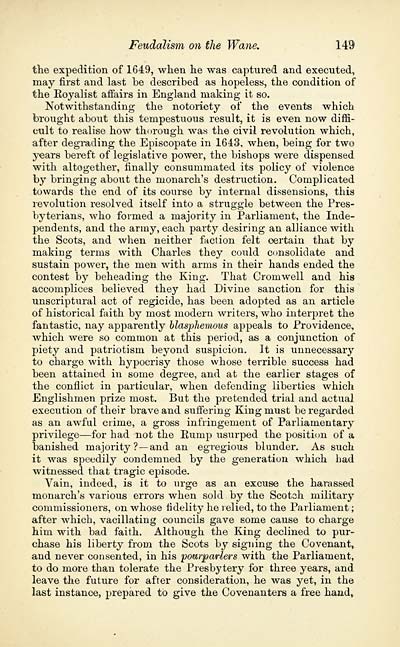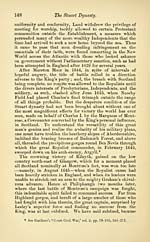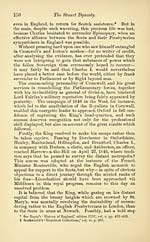Stuart dynasty
(169) Page 149
Download files
Complete book:
Individual page:
Thumbnail gallery: Grid view | List view

Feudalism on the Wane. 149
the expedition of 1649, when he was captured and executed,
may first and last be described as hopeless, the condition of
the Royalist affairs in England making it so.
Notwithstanding the notoriety of the events which
brought about this tempestuous result, it is even now diffi-
cult to realise how thorough was the civil revolution which,
after degrading the Episcopate in 1643, when, being for two
years bereft of legislative power, the bishops were dispensed
with altogether, finally consummated its policy of violence
by bringing about the monarch's destruction. Complicated
towards the end of its course by internal dissensions, this
revolution resolved itself into a struggle between the Pres-
byterians, who formed a majority in Parliament, the Inde-
pendents, and the army, each party desiring an alliance with
the Scots, and when neither faction felt certain that by
making terms with Charles they could consolidate and
sustain power, the men with arms in their hands ended the
contest by beheading the King. That Cromwell and his
accomplices believed they had Divine sanction for this
unscriptural act of regicide, has been adopted as an article
of historical faith by most modern writers, who interpret the
fantastic, nay apparently blasphemous appeals to Providence,
which were so common at this period, as a conjunction of
piety and patriotism beyond suspicion. It is unnecessary
to charge with hypocrisy those whose terrible success had
been attained in some degree, and at the earlier stages of
the conflict in particular, when defending liberties which
Englishmen prize most. But the pretended trial and actual
execution of their brave and suffering King must be regarded
as an awful crime, a gross infringement of Parliamentary
privilege — for had not the Eump usurped the position of a
banished majority ?— and an egregious blunder. As such
it was speedily condemned by the generation which had
witnessed that tragic episode.
Vain, indeed, is it to urge as an excuse the harassed
monarch's various errors when sold by the Scotsh military
commissioners, on whose fidelity he relied, to the Parliament ;
after which, vacillating councils gave some cause to charge
him with bad faith. Although the King declined to pur-
chase his liberty from the Scots by signing the Covenant,
and never consented, in his pourparlers with the Parliament,
to do more than tolerate the Presbytery for three years, and
leave the future for after consideration, he was yet, in the
last instance, prepared to give the Covenanters a free hand,
the expedition of 1649, when he was captured and executed,
may first and last be described as hopeless, the condition of
the Royalist affairs in England making it so.
Notwithstanding the notoriety of the events which
brought about this tempestuous result, it is even now diffi-
cult to realise how thorough was the civil revolution which,
after degrading the Episcopate in 1643, when, being for two
years bereft of legislative power, the bishops were dispensed
with altogether, finally consummated its policy of violence
by bringing about the monarch's destruction. Complicated
towards the end of its course by internal dissensions, this
revolution resolved itself into a struggle between the Pres-
byterians, who formed a majority in Parliament, the Inde-
pendents, and the army, each party desiring an alliance with
the Scots, and when neither faction felt certain that by
making terms with Charles they could consolidate and
sustain power, the men with arms in their hands ended the
contest by beheading the King. That Cromwell and his
accomplices believed they had Divine sanction for this
unscriptural act of regicide, has been adopted as an article
of historical faith by most modern writers, who interpret the
fantastic, nay apparently blasphemous appeals to Providence,
which were so common at this period, as a conjunction of
piety and patriotism beyond suspicion. It is unnecessary
to charge with hypocrisy those whose terrible success had
been attained in some degree, and at the earlier stages of
the conflict in particular, when defending liberties which
Englishmen prize most. But the pretended trial and actual
execution of their brave and suffering King must be regarded
as an awful crime, a gross infringement of Parliamentary
privilege — for had not the Eump usurped the position of a
banished majority ?— and an egregious blunder. As such
it was speedily condemned by the generation which had
witnessed that tragic episode.
Vain, indeed, is it to urge as an excuse the harassed
monarch's various errors when sold by the Scotsh military
commissioners, on whose fidelity he relied, to the Parliament ;
after which, vacillating councils gave some cause to charge
him with bad faith. Although the King declined to pur-
chase his liberty from the Scots by signing the Covenant,
and never consented, in his pourparlers with the Parliament,
to do more than tolerate the Presbytery for three years, and
leave the future for after consideration, he was yet, in the
last instance, prepared to give the Covenanters a free hand,
Set display mode to:
![]() Universal Viewer |
Universal Viewer | ![]() Mirador |
Large image | Transcription
Mirador |
Large image | Transcription
Images and transcriptions on this page, including medium image downloads, may be used under the Creative Commons Attribution 4.0 International Licence unless otherwise stated. ![]()
| Histories of Scottish families > Stuart dynasty > (169) Page 149 |
|---|
| Permanent URL | https://digital.nls.uk/94819794 |
|---|
| Description | A selection of almost 400 printed items relating to the history of Scottish families, mostly dating from the 19th and early 20th centuries. Includes memoirs, genealogies and clan histories, with a few produced by emigrant families. The earliest family history goes back to AD 916. |
|---|

